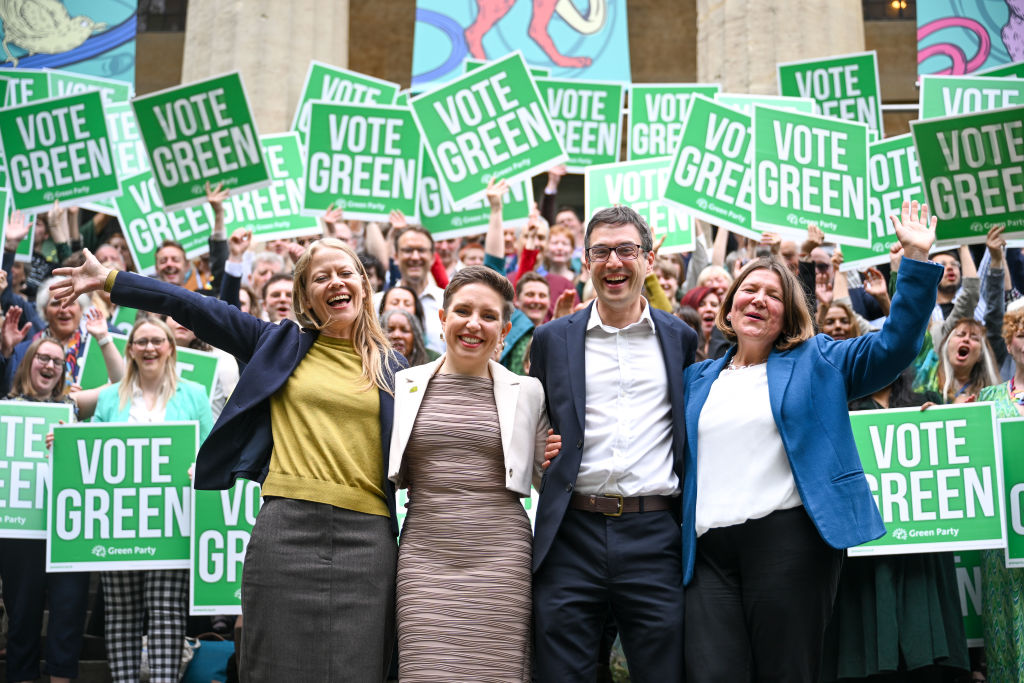Is the Green party the most controversial force in British politics? It’s certainly giving Reform a run for its money. In the past few months, the Greens have suspended a former London Assembly member and two-time London mayoral candidate after he lamented that colleagues had denounced the Cass Review. After the local elections, one councillor sparked outrage by shouting ‘Allahu Akbar’ to celebrate his victory. At the weekend, it was reported that three candidates for the party were no longer standing amid suggestions they made racist comments. What do traditional Green voters – those primarily driven by environmental concerns – make of these developments?
Now there’s the backlash to their scandalous maternity policy. In the wake of the Ockenden Review and the Birth Trauma Inquiry, it has emerged the Greens have been promoting ‘natural’ deliveries and promising to reduce Caesarean sections. Yet it was precisely this mindset – that intervention ought to be delayed, despite the risks to patient safety – that led to the tragic deaths of 300 babies and 12 mothers at Shrewsbury and Telford Hospital Trust. The language of ‘normal’ or ‘natural’ births was formally dropped by the Royal College of Midwives in 2017, so why is the Green party still deploying it?
They deserve to be looked at more closely
Perhaps it shouldn’t surprise us that the Greens want childbirth to become a non-medical event: the entire movement is hostile towards human progress, modernity and industrialisation. Caroline Lucas – the former Green leader – once declared we need to go cold turkey on our ‘addiction to economic growth’. Thanks to 14 years of Conservative government, we’re on our way.
But the madness doesn’t stop there. The Greens want free school meals for all primary and secondary pupils – a measure the IFS has said would cost an additional £2.5 billion a year. They promise to provide 35 hours of free childcare for all children over nine months, regardless of parental means. How on earth do they square freebies for higher-income parents with their insistence the rich pay their ‘fair share’?
They want rent controls, too – a policy which has failed everywhere it has been tried, most recently in Edinburgh, where the council has declared a housing crisis. Every time, rent controls lower both supply and quality: in Sweden, the average waiting time for an apartment rose to 11 years after price controls were imposed.
The Greens want a wealth tax which representatives claim could raise £40 to £50 billion when combined with levelling capital gains with income tax and removing the cap on National Insurance. Many OECD countries used to have wealth taxes but subsequently repealed them after discovering the administrative costs far outweighed the revenue raised, including Austria (in 1994), Denmark (in 1997), the Netherlands (in 2001), Finland, Iceland, and Luxembourg (all three in 2006). France introduced a wealth tax (in the 1980s) but later withdrew it.
The Greens also want more money for the NHS, a healthcare system they appear to view as flawless but chronically underfunded. Yet the UK spends above the OECD average on healthcare as a proportion of GDP – and has very poor patient outcomes. The Greens boast they would stop the NHS from being ‘privatised’, but even if we include GPs, pharmacists, optometrists and dentists, spending on non-NHS providers still only accounts for about a quarter of its budget – a figure which has barely changed in recent decades.
It would be easy to shrug all this off; after all the Greens still only hold around 800 of 17,000 council seats in England and Lucas is its sole MP. But, astonishingly, they are polling higher among the under-50s than both the Tories and Reform. They deserve to be looked at more closely.
Perhaps, at the macro level, there is some coherence to the Green agenda: if their goal is a retreat from prosperity, then their approach to decarbonisation – where we ban, tax, and curtail freedoms (at one point the party wanted to ration meat and dairy products), clobber enterprise, block building – is probably an efficient way to achieve it. But they’re playing at politics. When they have had responsibility – as on Brighton council – it descends into disaster. Increases to parking fees imposed by the Green party in Brighton cost the city more than £1 million over three years, as visitors were put off from going to the seaside resort. They squandered £46 million on a 531ft eyesore tower which has failed to generate the anticipated visitor revenue, while their rewilding experiment led to 2ft weeds colonising Brighton and Hove’s streets.
The Scottish Greens’ transgender policy wrecked the SNP coalition. They lecture us about ‘fairness’ when degrowth will hit the poorest hardest. They persistently block housing developments, yet advocate uncontrolled immigration. Perhaps most baffling is their opposition to both nuclear and, on some occasions, local solar farms. They don’t want clean energy, they just want less energy.
The Greens might not be the most controversial presence in British politics; but they are without doubt the most terrifying.






Comments